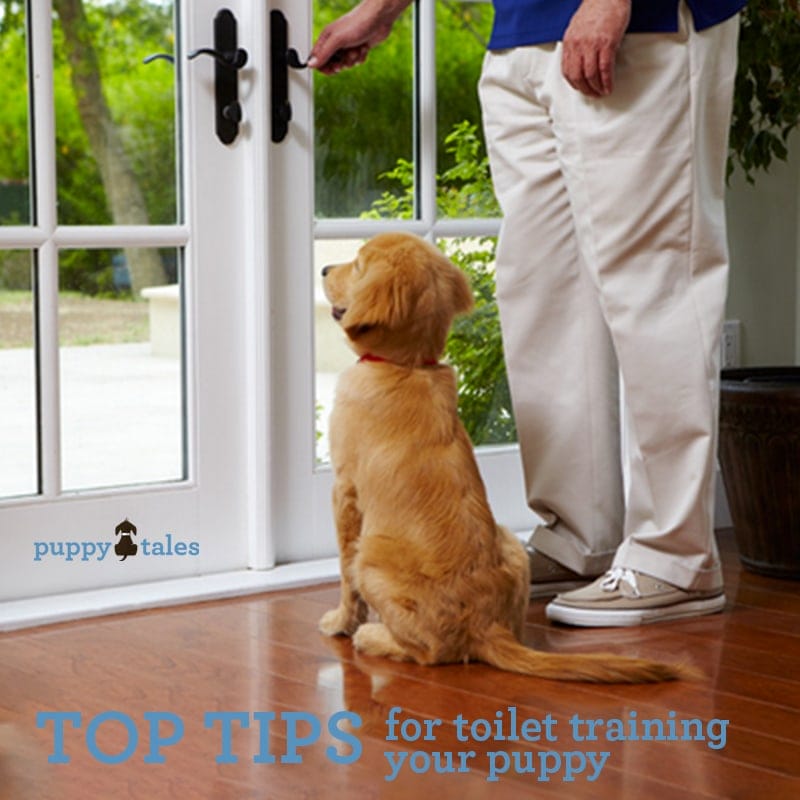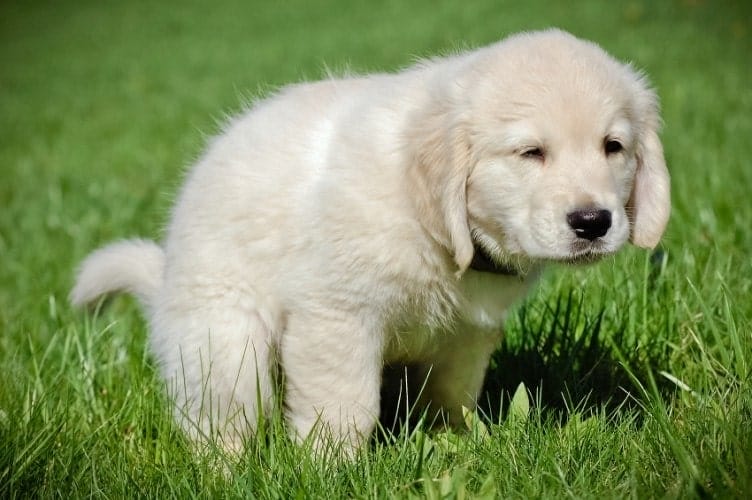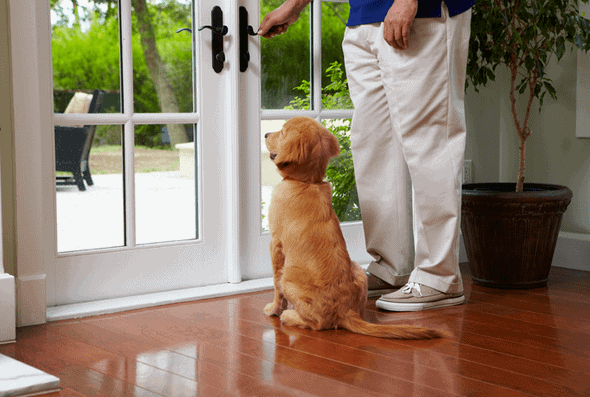The key to successfully toilet training a puppy lies in the motivation of the trainer. You!
Yes, that’s right! You are the key to successfully training your puppy to eliminate (wee and poo) in the spot that you would like them to go. If you don’t set them up for success by teaching them that it is far more beneficial to wee on the spot that you would like them to, and only punish them for their mistakes, then you are on the road to setting them up to fail.

At anywhere up to 6 months of age, puppies’ bladders are not fully developed and they have a high metabolism at this stage in their lives, which means that they have weak bladder control. After 6 months of age this should start to improve and your puppy should be able to hold it in overnight without needing to go, which will make the toilet training a lot easier. Until then, here are some fundamental guidelines that will help you successfully toilet train your puppy.

Be aware and take action
Be aware of the signs and key times when your puppy will need to go, and then take action. The most common times when your puppy will need to go are:
- When they first wake up from a nap
- When you arrive home after being out
- After they’ve eaten or had a big drink
- After any playtime that you have engaged in with them
Common signals to look out for when you are at home with your puppy:
- Sniffing the ground and moving in a circular motion
- Moving around and looking agitated
- Crying
- If (when training) you all of a sudden lose your puppy’s focus and your puppy becomes restless
Monitoring your puppy
- Keep your puppy in sight when in the house with you so that you can look out for the ‘I need to go to the toilet’ signs and take them out to the spot.
- If your puppy stays inside during the day leave the newspaper or training pads in one area rather than in spots all over the house as this causes a little inconsistency and confusion for the puppy.
- It is best to confine your puppy (when you are out) to a small area such as the laundry, puppy play pen or crate equipped with a bed, safe toys, food and water, and training pads.

Use a verbal cue
Get a word on cue. My verbal cue to let my dogs know that it is toilet time is ‘go toilet’! When my dogs hear this cue, they know exactly what it means: to go to the toilet. Not only can a verbal cue be useful when sending your puppy out to do their business at bedtime, it can be useful for road trips.
Implement a reward system
Work out what motivates your puppy to listen to you and train for you. I use a high value reward system such as BBQ chicken (just the white meat, not the bones or fatty skin), chicken loaf, or ham when training a cue or behaviour that is important to me. So if toilet training is on the top of your training priority list use rewards that your puppy loves in order to pair the reward with going to the toilet outside, on the training pad, or wherever it is that you want them to go.
Successful toilet training during the early stages is all about being consistent with taking your puppy to the spot that you want them to eliminate on and rewarding them every time they go on that spot. A lot of patience and guidance is required on your part. When you are at the desired spot and they’re about to go to the toilet, you say the cue that you are going to use — such as ‘go toilet’ — and when they have just about finished give them that yummy ‘high value’ treat.
Once they’re reliably going to the desired spot with an 80% success rate you can start to reduce the amount of treats that you give to them, making your schedule of reinforcement variable and unpredictable. This is so they can’t predict when they’ll be rewarded with treats, but will still work for you in the hope that they may be rewarded.
The exception to this rule is the rain! Rainy weather can affect your puppy’s motivation to head outside to eliminate on the wet cold grass, so make sure you have treats on hand during wet weather.
What to do and what not to do when your puppy makes a mistake
Hitting or yelling at your puppy or even worse, rubbing their nose in it for making a mistake is not only cruel but it can also prolong the training process. So when you come home and find a mistake that your puppy made hours ago and rub their nose in it, they cannot understand that the reason you are punishing them is because of something that (a) they naturally need to do and (b) that they did hours ago. The association that they will make is you coming into the house angry and punishing them.
This can actually cause more stress and anxiety in your puppy as your interactions with them have become unpredictable and scary at times. It is better to work on rewarding the behaviour you want in order to achieve quicker and better results. If they make a mistake then just remove them from the room without making a fuss, clean it up and keep an eye on them in the house so you can look out for the signs.
Using the right cleaning products
Make sure that you clean the spot where your puppy has made a mistake in the house thoroughly in order to remove any trace of urine. Not cleaning up the area properly may encourage your puppy to continue eliminating in that particular spot because it smells like a doggy toilet.
Cleaning tips to follow:
- Do not use ammonia based products, as ammonia can enhance the smell of urine and make the spot smell more like a toilet.
- Using a clothes washing powder such as Biozet is a great neutraliser which helps get rid of the smell.
- Products on the market such as Urine Off can help.
- Some of my clients swear by hot water and vinegar for the floor-boards.
In summary
Look out for the signs, keep an eye on your puppy in the house, and limit their access in the house when you are out. The more you take them to the spot at the key times i.e. after meals, when you arrive home, when your puppy wakes up, etc. the quicker they will understand that this is where you would like them to go, as they are not interrupted each time. Instead, they’re rewarded with a yummy treat and lots of verbal praise and cuddles from you every time they goes there. So do more of the training and less of the punishing in order to be successful with toilet training your puppy.

Michelle O’Brien
Michelle started her career at the age of 14 as an Animal Attendant and in her early 20’s became a Veterinary Nurse. Her dog training career started 12 years ago when she was offered the opportunity to run puppy preschool classes.
Michelle’s training qualifications centre around positive reinforcement methods, being a Delta Canine Good Citizen Trainer and gaining a Certificate IV in Companion Animal Services. Michelle is also a member of the Delta Professional Dog Trainers Association.


